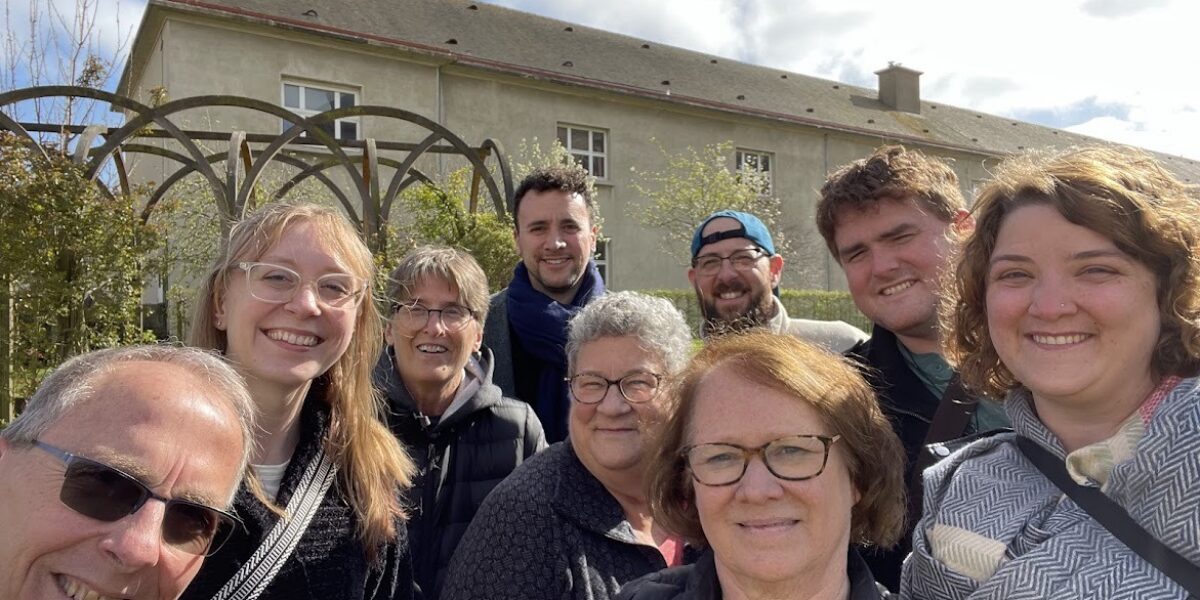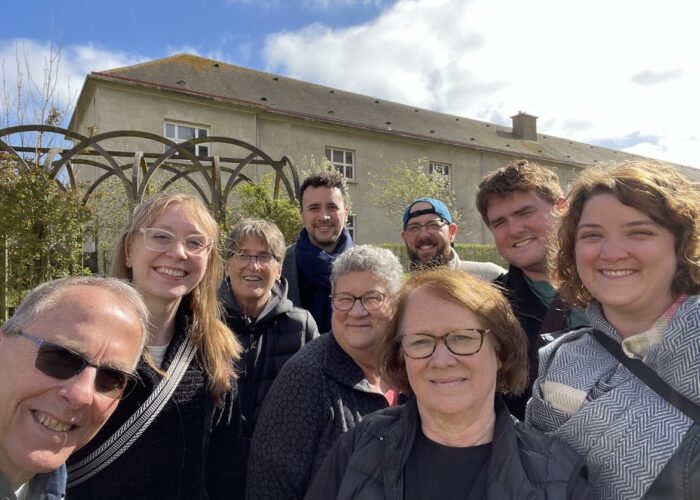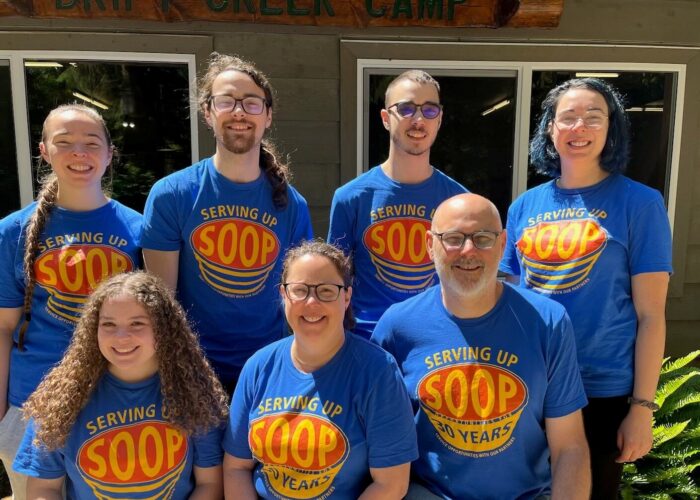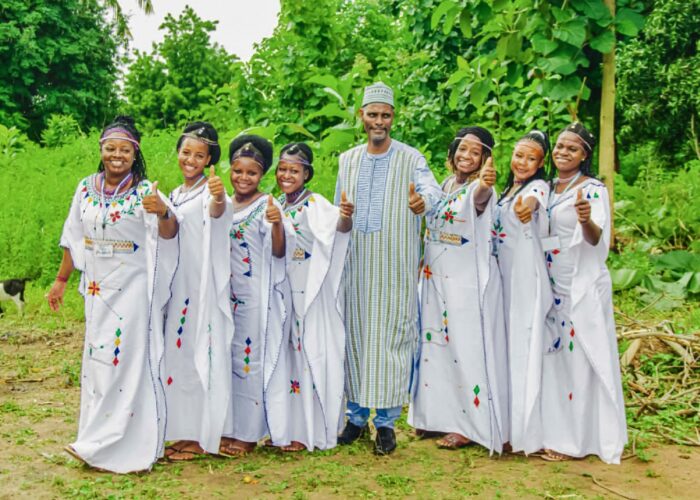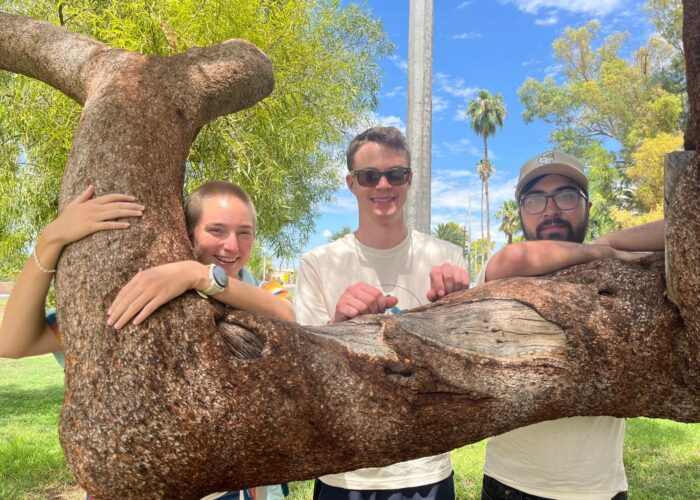Shelby Rudy journeyed to France for chapter two of the Christ at the Borders Just Peace Pilgrimage in Calais. She was joined by eight other adults, including Mission Network staff, as well as Joseph and Rachel Givens, who serve with Mission Network at the Maria Skobtsova House. This blog was originally posted to Shelby’s website on May 4.
On April 6, I went from Portland, Oregon to Paris to join six other pilgrims and our host family to journey to Calais, France. We learned about the migrant crisis and organizations in Calais that offer humanitarian aid. We also traveled to the United Kingdom (UK) to hear stories of men and women who have successfully migrated. This trip was organized by Mennonite Mission Network.
Preparing
Before the trip, we had two zoom meetings to meet one another and discuss logistical, historical, and safeguarding details. Mission Network workers Joseph and Rachel Givens, our guides on this trip, encouraged us to meditate and reflect on the following verses:
“He has shown you, O mortal, what is good. And what does the LORD require of you? To act justly and to love mercy and to walk humbly with your God.” – Micah 6:8 (NIV)
“When a stranger resides with you in your land, you shall not do him wrong. ‘The stranger who resides with you shall be to you as the native among you, and you shall love him as yourself, for you were aliens in the land of Egypt; I am the LORD your God.” – Leviticus 19:33-34 (NIV)
“‘For I was hungry, and you gave Me something to eat; I was thirsty, and you gave Me something to drink; I was a stranger, and you invited Me in; naked, and you clothed Me; I was sick, and you visited Me; I was in prison, and you came to Me.’” – Matthew 25:35-36 (NIV)
They encouraged us to think about what it means to do justice and to act with mercy toward the immigrant, reflect on who is an immigrant, and what it means to love my migrant neighbor. We also learned a bit about Calais. Calais is a port city, located on the Strait of Dover, the narrowest part of the English Channel. It is the closest point in mainland Europe to England, approximately 21 miles (34 kilometers) from Dover, England, across the strait. It has been politically important throughout history, repeatedly besieged including during WWII when it was destroyed). For generations, Calais has served as a stop for refugees fleeing various crises on their way to the UK. We also learned safeguarding measures, for ourselves and others. We were to keep the mentality of emphasizing a “do no harm” approach while interacting with migrants and other vulnerable people.
Portland -> Paris -> Calais
We stayed at the Paris Mennonite Center the night we arrived. Directors of the Paris Mennonite Center, Ben and Laural Woodward-Breckbill, were gracious hosts, providing meals and making sure the space was comfortable. In the mornings, we started our days with a reading from CommonPrayer.net and singing. Tuesday morning, before we set out for Calais, Joseph Givens reminded us of the greatest commandment as stated in Matthew 22:36-40:
Jesus replied: “‘Love the Lord your God with all your heart and with all your soul and with all your mind.’ This is the first and greatest commandment. And the second is like it: ‘Love your neighbor as yourself.’ All the Law and the Prophets hang on these two commandments.” (NIV)
These have been meaningful verses to me as I’ve wrestled with my role within the church. This is what I strive to do as a Christian: to love God and to love others.
Maria Skobtsova House (MSH)
On Wednesday we visited our first of the associations (non-profits) that serve the migrant community — the Maria Skobtsova House (MSH).This is a home intended to house migrant women and children. While there, we ate lunch with the current residents — both migrants and volunteers. We brought pizza, which the children were very excited about. As we sat down to eat, there was a natural divide between English speakers and non-English speakers. Even as I participated in this division, it made me sad. One member of our group bridged the divide by asking one of the children brain teasers, and we sang “Happy Birthday” to one of the girls who would be celebrating the next week — hopefully in the UK. After that, we learned about MSH, who Maria Skobtsova was, how the home was founded, and its purpose now.
We shared a Taizé service, consisting of reading, singing, and times of quiet reflection. While the Americans were in one room, many of the women residents were in the kitchen just adjacent, laughing and having, as one of my pilgrim-mates described it, “a holy moment of their own.” This home gives women the space to feel welcome and to be at ease enough to share laughter with one another. The intention of MSH is to provide a home that the women can call their own. They cook for one another and were generous hosts. Amid their unknowns, it gives them something that is theirs. Later, we received the good news that all the women and children in the house while we were visiting made it successfully to the UK.
Touring Calais
After our introduction to MSH, we took a tour of the city. It was disheartening to see some of the direct measures the French government officials (with the UK’s money) is taking to prevent migrants from having any kind of stability. In 2015, the National Police pushed the migrant community into an area that became known as “The Jungle.” A little more than a year later, the same police tore the community down. We visited the remnants of The Jungle and witnessed the fencing and boulders put in different areas to prevent migrants from camping and associations from distributing aid. One thing I learned is that no matter how much safety and stability you take away, people will continue to persevere.
On this tour, we also visited a hospital for undocumented people, a small building next to the large hospital where anyone with papers could get help. According to the Givens, the women from MSH are often treated well there, but there have been times that, due discrimination, women have had a difficult time getting appointments or the help they need.
Finally, we visited a graveyard where many migrants who died crossing the English Channel are buried. On top of paying smuggling fees and the other costs of life, a burial in Calais can cost around 2,000 euro (almost $2,300 USD). I was struck by not only the number of graves, but the contrast between migrant graves and those of the locals.
La Mer
The next morning, we visited La Mer (The Sea), another association supporting migrating people in Calais, where we met with a mentor of the Givens and an employee of Social Justice Network, Bradon Muilenburg. He shared about the politics of migration, both globally and on the border we were visiting. As a group we discussed:
- Necropolitics – “Necropolitics is a sociopolitical theory of the use of social and political power to dictate how some people may live and how some must die.” In the context of borders, I understood this as an effort to make life so miserable that the only choice is to attempt a crossing, which is dangerous and many people die doing so — not just in Calais, but all over the world.
- How borders are made in blood, both by explicit and implicit decisions that are made (reserving life vests for people with papers, depriving people of vital resources, having an electric fence on the border).
- The hypocrisy of the UK government when talking about migrants coming across “legally.” When we cross on the French side, we are checked by UK Border Control. However, there is no such place for migrants to claim asylum in the UK from the French side. In fact, there is no legal way for them to get to the UK, so they are forced to cross in dangerous circumstances.
A website tracks known migrant deaths of migrants trying to cross to the UK since 1999, and volunteers have carved the names and years of death on wooden panels. Muilenburg, collaborating with the Anglican church, plans to display these panels during Refugee Week at Canterbury Cathedral. We were tasked to organize them in chronological order, encouraged to reflect upon each panel and the person family they left behind, their dreams, and the desperation that led them to make this dangerous passing. At lunch, Rachel Givens read the story of a group of Chinese migrants who were found suffocated in a truck. In 2024, migrant deaths reached a record high.
Effata
We then crossed the street to a hospitality home for men, Effata, where three Italians greeted us with cake and tea. The home is for men aged 18+ and for those battling sickness or injury that would get exacerbated on the streets. Two things that struck me here:
- This home — along with MSH, an emergency hotel for the first few nights, and individuals who allow migrants to sleep in their home for one night — are the only structured places for migrants to stay. There are abandoned buildings that they squat in and tent camps they stay in, but those are not as safe nor as livable.
- Effata has a connection with a local bakery where they get bags of leftover bread which they share with the other associations in Calais. This is just one example of the many ways that the associations in Calais come together to help migrants.
Just Peace Pilgrimages are designed for participants to listen, learn and explore what God is doing to bring about justice and peace in the world. To learn more about Just Peace Pilgrimages, including how you can sign up, visit MennoniteMission.net/JustPeace.

